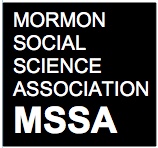Attached is a syllabus used by Armand Mauss in a recent course taught at Claremont Graduate University. Professor Mauss agreed to posting this only if several clarifications were included: First, the syllabus changed over the course. If he were to teach the course again he would substantially change the syllabus. Second, the course was designed with non-Mormon students in mind. As a result, some of the content would be unnecessary for a class of Mormon students.
essential readings in the social science of Mormonism
Scholars interested in the social science of Mormonism would do well to begin their research on the topic by reading the following books:
- Altman, Irwin and Joseph Ginat. 1996. Polygamous Families in Contemporary Society
. Cambridge: University of Cambridge Press.
- Cornwall, Marie, Tim B. Heaton, and Lawrence A. Young, Editors. 2001. Contemporary Mormonism: Social Science Perspectives
. 2nd ed. Illinois: University of Illinois Press.
- Duke, J.T. 1998. Latter-Day Saint Social Life: Social Research on the LDS Church and Its Members
. Bookcraft Pubs.
- Heaton, Tim B., Stephen J. Bahr, and Cardell K. Jacobson. 2005. A Statistical Profile of Mormons: Health, Wealth, and Social Life
. New York: Edwin Mellen Press.
- Jacobson, Cardell K., Editor. 2004. All God’s Children: Racial and Ethnic Voices in the LDS Church
. Springville, UT: Bonneville Books.
- Mauss, Armand. 2003. All Abraham’s Children: Changing Mormon Conceptions of Race and Lineage
. Illinois: University of Illinois Press.
- Mauss, Armand L. 1994. The Angel and the Beehive: The Mormon Struggle With Assimilation
. Illinois: University of Illinois Press.
- O’Dea, Thomas F. 1957. The Mormons.
University of Chicago Press.
- Phillips, Rick. 2004. Conservative Christian Identity and Same-Sex Orientation: The Case of Gay Mormons
. New York: Peter Lang Publishing.
- Shepherd, Gary and Gordon Shepherd. 1984. A Kingdom Transformed
. Salt Lake City: University of Utah Press.
- Shepherd, Gary and Gordon Shepherd. 1998. Mormon Passage
. Illinois: University of Illinois Press.
- Stark, R., & Neilson, R.L. 2005. The Rise of Mormonism
. Columbia University Press.
2006 – business meeting minutes
2006 – Fall Newsletter
Mauss Bibliography
After putting it off for a couple of years, I finally digitized the bibliography MSSA member Armand Mauss put together a few years ago. The process took a while as I didn’t just want to scan the bibliography into an electronic format but also transfer all of the references into reference managing software, like ProCite or EndNote.
I’ve attached several files to this post. First is a PDF copy of the Bibliography with bookmarks for the corresponding sections. I have also attached a Word copy of the same. Additionally, I have attached a .zip file.zip file containing a ProCite database with all of the references broken into groups. Finally, I’ve attached a ZIP file. that contains all of the sections of the bibliography as individual RIS files for importing into a reference manager (it is a pretty universal format for importing references into reference management software).
If you have any questions or problems with the files, let me know.
Q: Can you give me statistics on the “average” mormon woman (age, race, marital status, employment, number of children, etc)?
A: The best data I know of on this question come from a study by Heaton, Goodman, and Holman that was originally published in 1994 and republished in 2001 looking at the characteristics of Mormon families. Their study analyzes data from the National Survey of Families and Households (NSFH). Newer data from the NSFH is available, but has yet to be analyzed on this question (as far as I know). Here is the data on the variables you asked about:
| Mormon women | non-Mormon women | |
| age | 44.8 | 45.2 |
| race (% white, non-Hispanic) | 94.3 | 79.8 |
| employment (% gainfully employed) | 54.6 | 55.0 |
| mean income | $6,263 | $7,905 |
| mean years of education (12 is a high school degree; any more indicates years of college) | 13.0 | 12.6 |
| number of children | 2.96 | 2.04 |
| ideal number of children | 4.61 | 2.78 |
| % in metropolitan area | 49.7 | 69.8 |
| % in West | 44.8 | 45.2 |
| % currently married | 63.4 | 53.8 |
| % ever divorced | 28.1 | 27.8 |
| mean age at marriage | 21.0 | 21.3 |
| % who have cohabited | 7.9 | 15.7 |
| mean frequency of sexual intercourse (in the last month) | 8.0 | 7.2 |
| mean hours spent in household tasks per week (washing laundry, cooking, etc.) | 57.4 | 44.9 |
Here is the actual reference for the data if you’d like to look it up and see all of the other information they include: Heaton, Tim B.; Goodman, Kristen L., and Holman, Thomas B. In Search of a Peculiar People: Are Mormon Families Really Different? Cornwall, Marie; Heaton, Tim B., and Young, Lawrence A., Editors. Contemporary Mormonism: Social Science Perspectives. 2nd ed. Illinois : University of Illinois Press; 2001; pp. 87-117.
Another book published by members of the MSSA on this topic is:
Heaton, Tim B.; Bahr, Stephen J., and Jacobson, Cardell K. A Statistical Profile of Mormons: Health, Wealth, and Social Life. New York: Edwin Mellen Press; 2005.
2006 – Spring Newsletter
MSSA Paper Competition
Would you like to see early publication of your work on Mormons from a thesis, dissertation, senior project, or class paper? The Mormon Social Science Association (MSSA) is sponsoring a student paper competition (both undergraduate and graduate) for papers employing social scientific perspectives in the analysis of Mormon social life and culture.
The top three winners will be invited to present their research at the annual meetings of the Society for the Scientific Study of Religion in a session sponsored by the MSSA, and the papers will be published on the MSSA website (www.mormonsocialscience.org). The winners will also receive $300 each to defray travel costs to the conference. In addition, the first place winner will receive a $100 prize, and a summary of his or her paper will be included in the semi-annual MSSA newsletter. Submission of a paper to this MSSA competition will not preclude submission of the same paper to any other competition.
Requirements:
An abstract of about 250 words must be submitted for each entry by December 31, 2005. The abstract should describe the general nature and thesis of the paper, as well as the kind of data on which it will be based. The completed paper, postmarked by March 1, 2006, should be no longer than 30 pages, including tables, notes, and references. Submissions and questions should be sent electronically to ryan@genesoc.com.
A $10 submission fee is required but the fee includes a 1-year membership in the MSSA and a 1-year subscription to the MSSA newsletter. Winners will be announced within 1 to 2 months of the submission deadline.

